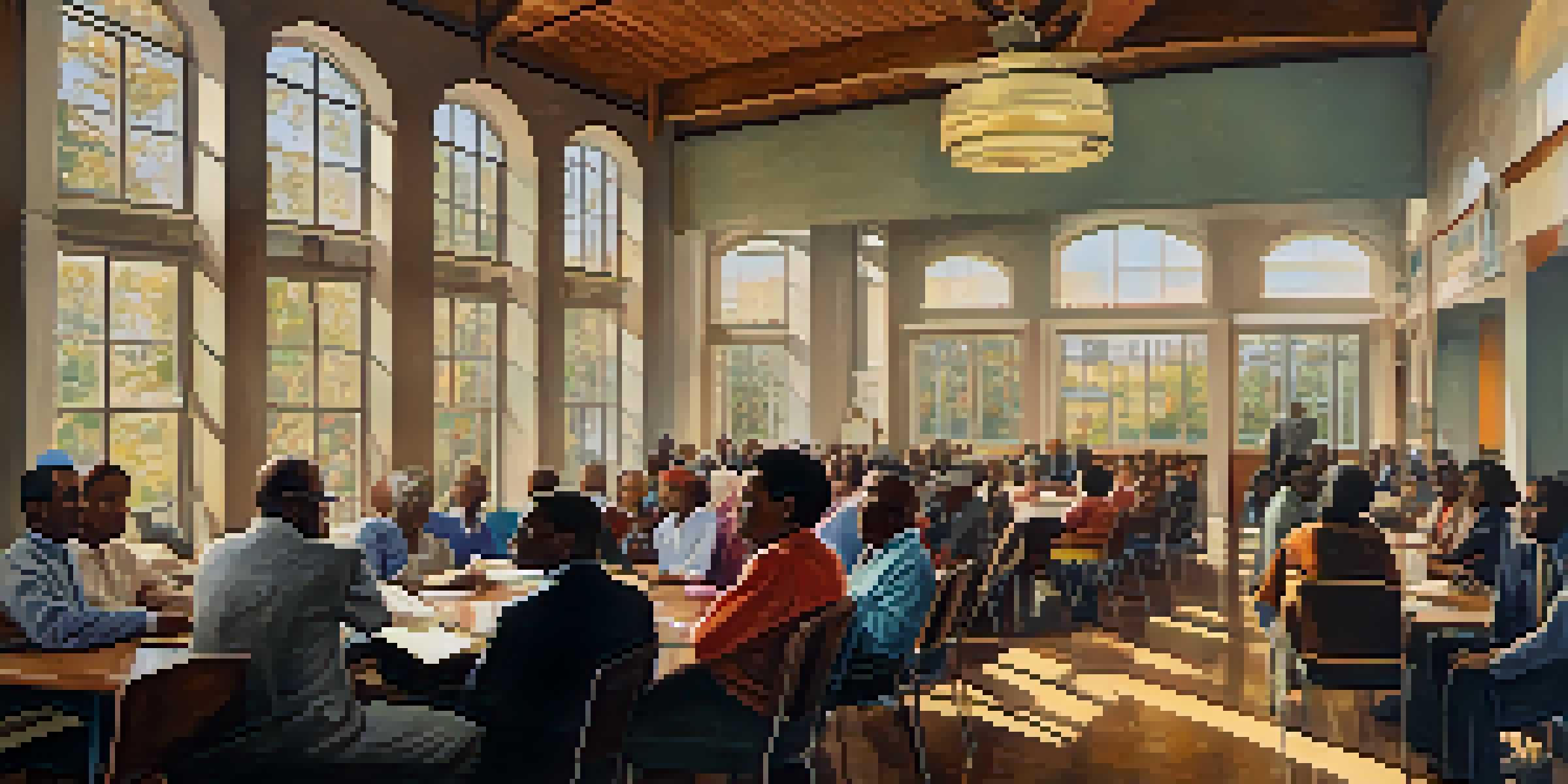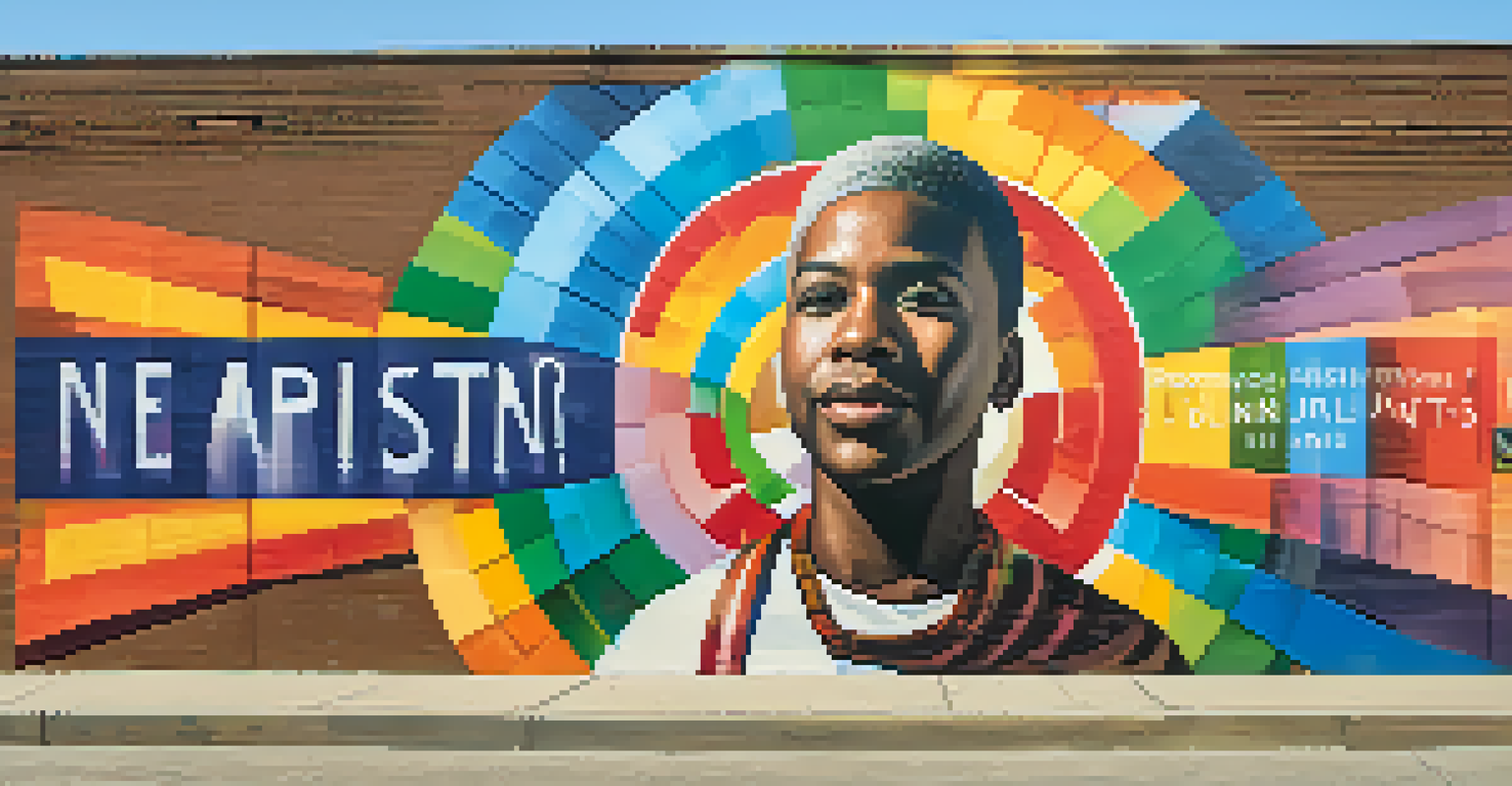Julian C. Dunn: Advocate for Civil Rights in Austin's History

Early Life and Influences of Julian C. Dunn
Julian C. Dunn was born in Austin, Texas, in the early 20th century, a time when racial segregation was deeply entrenched in society. Growing up in this environment, he witnessed firsthand the injustices faced by African Americans, which sparked his passion for civil rights. His upbringing in a close-knit community instilled in him the values of resilience and social justice, setting the stage for his future advocacy.
Injustice anywhere is a threat to justice everywhere.
Dunn's education played a pivotal role in shaping his worldview. He attended local schools that were often underfunded and overcrowded, which highlighted the disparities in educational opportunities between races. This experience motivated him to fight for equality, not just for himself but for future generations who deserved better.
Inspired by leaders of the civil rights movement, Dunn began to immerse himself in activism during his college years. He joined organizations advocating for racial equality, where he learned the importance of community organizing and grassroots efforts. These formative experiences would lay the groundwork for his lifelong commitment to civil rights.
Dunn's Involvement in the Civil Rights Movement
As the civil rights movement gained momentum in the 1950s and 1960s, Julian C. Dunn emerged as a key figure in Austin. He became involved with local civil rights organizations, working tirelessly to challenge discriminatory practices in housing, education, and employment. Dunn's dedication to these causes made him a respected leader among his peers and younger activists alike.

One of his notable achievements was organizing peaceful protests against segregation in public facilities. These actions often drew significant attention, highlighting the ongoing struggles for equality in Austin. Dunn understood that nonviolent resistance was essential for effecting change, and he encouraged others to join the movement with this philosophy in mind.
Dunn's Activism Shaped Civil Rights
Julian C. Dunn played a crucial role in the civil rights movement in Austin, advocating for equality in housing, education, and employment.
Dunn's advocacy extended beyond just protests; he also worked to establish dialogue between community leaders and city officials. By fostering these conversations, he aimed to create understanding and promote policies that would dismantle systemic racism. His efforts were instrumental in paving the way for legislative changes that benefited marginalized communities.
Advocating for Education and Equal Opportunity
Education was a cornerstone of Julian C. Dunn's activism. He believed that access to quality education was a fundamental right that could empower individuals and uplift communities. To this end, he fought against discriminatory practices in schools, advocating for equal funding and resources for African American students in Austin.
The time is always right to do what is right.
Dunn's efforts led to significant reforms in the local education system. He collaborated with teachers, parents, and school board members to ensure that all students, regardless of race, had the opportunity to succeed academically. His commitment to educational equity resonated with many, inspiring a new generation of activists to continue the fight.
In addition to advocating for better schools, Dunn also focused on vocational training programs. He recognized that education was not just about traditional academics but also about equipping individuals with practical skills for the workforce. By promoting these programs, he aimed to enhance job opportunities for African Americans in Austin.
Julian C. Dunn's Legacy in Austin
Julian C. Dunn's impact on civil rights in Austin is felt to this day. His tireless work not only challenged the status quo but also inspired countless individuals to stand up against injustice. The changes he fought for have contributed to a more inclusive and equitable society in Austin, reflecting his vision for a better future.
In recognition of his contributions, various organizations and institutions have honored Dunn's legacy. Schools, parks, and community centers bear his name, serving as reminders of his commitment to civil rights. These tributes ensure that his story and the lessons learned from his activism continue to resonate with new generations.
Education as a Fundamental Right
Dunn believed access to quality education was essential for empowerment, leading efforts to reform discriminatory practices in local schools.
Dunn's legacy is not just about the victories he achieved but also about the spirit of activism he instilled in others. His belief in the power of community and the importance of standing up for one's rights continues to inspire current and future advocates for social justice.
Challenges Faced by Dunn and His Peers
Despite his dedication, Julian C. Dunn faced numerous challenges throughout his activism. The backlash from segregationists and those resistant to change often posed threats to his safety and the safety of his peers. Yet, Dunn remained undeterred, believing that the struggle for civil rights was worth the risks involved.
Dunn also encountered obstacles within the civil rights movement itself. Differences in ideology and strategy among activists sometimes led to tensions that complicated efforts to unite the community. However, Dunn was known for his ability to bridge divides, encouraging collaboration and understanding among various factions.
Even as he faced these challenges, Dunn remained focused on his mission. He understood that progress was often slow and required perseverance. His unwavering commitment to justice served as a beacon of hope for many who were also fighting for equality.
Community Engagement and Mobilization
Julian C. Dunn firmly believed that grassroots engagement was essential for driving change. He organized community meetings to discuss issues affecting African Americans in Austin, empowering residents to voice their concerns and share their experiences. This approach created a sense of solidarity and encouraged collective action.
Dunn also emphasized the importance of voter registration and civic participation. He spearheaded initiatives aimed at increasing voter turnout among African Americans, understanding that political representation was crucial for enacting change. His efforts resulted in a more informed and engaged electorate, ready to advocate for their rights.
Legacy of Community Engagement
Dunn's grassroots approach to activism inspired future generations to actively participate in the fight for social justice and equality.
By mobilizing the community, Dunn demonstrated that real change starts from the ground up. His work inspired many to take an active role in advocating for their rights, proving that individual voices can unite to create a powerful force for social justice.
Julian C. Dunn's Influence on Future Generations
The influence of Julian C. Dunn extends far beyond his lifetime. His commitment to civil rights and social justice has inspired numerous individuals and organizations in Austin and beyond. Many young activists cite Dunn as a vital source of inspiration in their own journeys toward advocating for equality.
Educational programs and workshops dedicated to civil rights often reference Dunn's contributions, ensuring that his story is passed down to future generations. By studying his life and work, young activists learn the importance of perseverance and community engagement in the fight for justice.

Dunn's legacy serves as a reminder that the struggle for civil rights is ongoing. As new challenges arise, his example encourages individuals to remain steadfast in their commitment to creating a more just society, embodying the spirit of activism that he championed throughout his life.